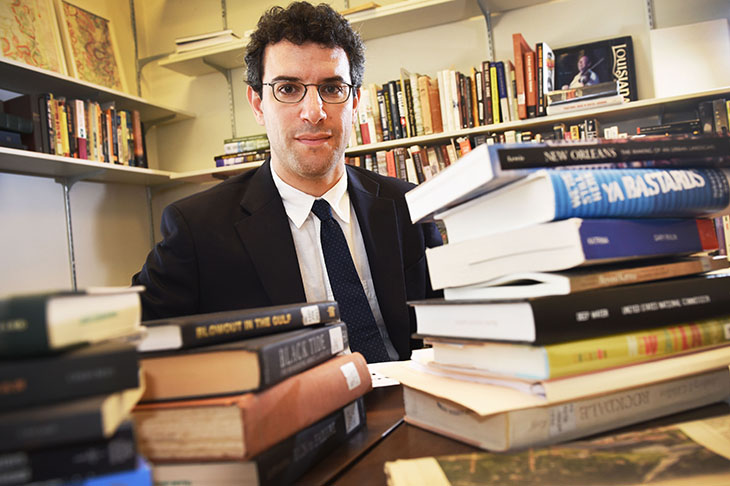Hurricane Katrina as a learning tool

Andy Horowitz, an assistant professor of history, is assigning many diverse readings on Hurricane Katrina for students in his course, The Katrina Disaster Now. (Photo by Cheryl Gerber)
When Andy Horowitz, a disaster history expert, announced that he would be leading a seminar class at Tulane University on Hurricane Katrina this fall, students signed up in droves.
With the class limited to 15 students, most ended up on the waiting list. Horowitz, an assistant professor of history, wasn't surprised by the response.
“I think when students come to Tulane, it's partially because they want to engage with this city,” he said. “And this course offers them a way to become engaged with their new home. It gives them a way to care about New Orleans.”
The course, The Katrina Disaster Now, explores Katrina as a political, cultural and environmental event in the history of New Orleans, the United States and beyond. It looks at Katrina, as Horowitz describes it, “as an ongoing process with causes and consequences that stretch across a century.”
As such, Horowitz said, the class begins with the founding of New Orleans in the early 18th century, covering everything from the drainage system to racial segregation. The second part deals with issues surrounding Katrina such as evacuation, housing and education. In the final part of the class, students will look at coastal erosion and other present-day problems.
“We're going to take a kayak tour in the swamps,” he says. “We're going to take a bus tour of the city. And students will get to meet and have lunch with some really interesting people. We're using the city and the region as the classroom.”
Speakers include New Orleans activist Malik Rahim and Josh Guild, an assistant professor of history and African American studies at Princeton University who is writing a book on the struggles for racial and economic justice in New Orleans from the mid-20th century through the aftermath of Katrina and the BP oil disaster.
Horowitz's class, which will include a speaker's series open to the public, is being funded through the William L. Duren '26 Professorship and through the generosity of an anonymous donor.

